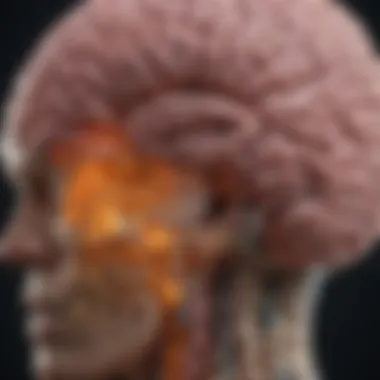The Neurological Effects of Alcohol on Brain Function


Intro
Alcohol has a profound impact on the brain, influencing both its structure and function. This complex relationship between alcohol and neurology unravels the intricacies of human behavior, cognition, and mental well-being. Understanding this topic is crucial because many people engage with alcoholic beverages, often overlooking the potential risks associated with their consumption. This article offers a comprehensive examination of how alcohol affects neurological processes, emphasizing the importance of this knowledge for individuals interested in their mental health.
Understanding Mental Health and Well-being
What is Mental Health?
Mental health encompasses emotional, psychological, and social well-being. It defines how we think, feel, act, and relate to others. Optimal mental health is key in navigating stress and life challenges effectively. Imbalances or disorders in mental health can have substantial consequences for individuals, making it crucial to recognize the relevance of this to alcohol consumption.
The Importance of Prioritizing Mental Well-being
Prioritizing mental well-being affects not only personal enjoyment but also productivity and social relationships. Healthy advocates emotional stability and resilience, enabling better decision-making even in situations involving alcohol. Understanding these principles ensures individuals are more aware of risks associated with excessive consumption.
Common Mental Health Challenges and Disorders
Many people encounter different mental health challenges at various points. Common issues include anxiety disorders, depression, and substance use disorders. Alcohol can exacerbate these conditions, trapping individuals in cycles of dependence. Recognizing these challenges helps highlight alcohol's potential effect on one’s mental landscape.
Key Point: Alcohol can increase vulnerability to mental health challenges, alike anxiety and depression, making integration in discussions about mental wellness essential.
The Neurological Mechanisms of Alcohol on the Brain
Short-term Effects of Alcohol on the Brain
When alcohol is consumed, it rapidly affects the brain. One immediate effect is the alteration of neurotransmitter function. Alcohol mainly increases gamma-aminobutyric acid (GABA) activity, which creates a calming effect, leading to reduced anxiety and shyness. However, this is a short-lived effect and often results in decreased cognitive function and impaired coordination.
Long-term Consequences of Alcohol Consumption
Extended alcohol use leads to significant long-term consequences on brain function. Chronic alcohol consumption is linked to structural changes in the brain. Specifically, it affects areas like the prefrontal cortex and hippocampus, essential for decision-making and memory, respectively. Symptoms can be distressing, such as attention deficits, learning difficulties, and impaired judgment.
Mental Health and Alcohol Use: Taking Action
Recognizing When Alcohol Becomes a Problem
Identifying problematic behavior is crucial for timely intervention. Engaging in open conversations about drinking habits and how they may relate to mental health represents an essential step towards improvement. Products like the CAGE Questionnaire can help in self-evaluation of alcohol habits.
Seeking Professional Help: Therapy and Counseling
If alcohol consumption presents a barrier to mental wellness, professionals can help facilitate the journey towards recovery. Various treatment modalities exist. Cognitive Behavioral Therapy notably helps by teaching coping strategies, acknowledging underlying mental health issues tied to alcohol use.
Resources for Support
- National Institute on Alcohol Abuse and Alcoholism: link
- Substance Abuse and Mental Health Services Administration: link
Finale
To navigate one's relationship with alcohol appropriately, a deeper understanding of the neurological impacts is essential. This not only informs decisions related to consumption but also supports overall mental health and well-being, leading to a healthier life.
Prelims
Understanding the impact of alcohol on the brain is crucial in promoting mental health and wellness. Alcohol is a widely consumed substance, and its effects are far-reaching. Studying these effects is not just a matter of scientific curiosity; it has real implications for individuals and society as a whole.


The consumption of alcohol affects physiological functions, cognitive abilities, and emotional well-being. For those who prioritize mental health, it is important to comprehend both short-term and long-term impacts. Knowledge about how alcohol influences decision-making, memory, and even emotional regulation can guide healthier choices.
Additionally, intelligence about these effects can prepare individuals for potential consequences associated with excessive use. Most people associate benefits of minimal consumption with relaxation and social ease. However, it's essential to consider the neurological degradation that may occur over time, impacting brain structure and function.
By correlating scientific findings with personal experiences and clinical observations, this article aims to provide clarity on this crucial issue. While some effects may appear negligible at first, they can accumulate over time and lead to irreversible changes. Thus, the insights gained here will aid individuals in making informed choices regarding their drinking habits and their overall mental wellness.
Understanding Alcohol's Effects on the Brain
Understanding how alcohol affects the brain is crucial for grasping its broader implications on human behavior, cognition, and overall mental health. Alcohol is not merely a substance for social interaction; it has a profound impact on neurological processes guideline that control various functions within the brain. By investigating these effects, one gains insight into how long-term consumption affects brain structure and cognitive capabilities. This section delves into specific elements of alcohol's influence, exploring both immediate and pervasive effects on the brain.
Overview of Alcohol Metabolism
Alcohol metabolism is the biochemical process through which the body breaks down ethanol, the active component in alcoholic beverages. When consumed, alcohol is absorbed into the bloodstream, with the liver playing a key role in its metabolism. The liver catalyzes the breakdown through a series of enzymatic reactions, primarily involving the enzyme alcohol dehydrogenase. This process converts ethanol into acetaldehyde—an intermediate that is further metabolized into acetate, which eventually is transformed into carbon dioxide and water for elimination.
Interestingly, the efficiency of alcohol metabolism can vary from person to person. Factors such as age, genetics, sex, and overall health can influence metabolic rates, thus affecting alcohol's impact. Higher alcohol intake than the liver can process can lead to concentrations that impair neurological functions quite rapidly.
Short-term Effects of Alcohol
Short-term alcohol consumption produces a range of immediate effects that depend on the dose and individual tolerance levels. These effects manifest due to alcohol’s interaction with neurotransmitters in the brain. Moderate consumption can lead to feelings of relaxation and euphoria. However, excessive intake can impair judgment, result in slurred speech, and lead to decreased coordination within minutes of consumption.
In small doses, alcohol can work as a stimulant, minimizing feelings of anxiety but also inhibiting the brain's inhibitory processes. With increasing amounts, the depressant properties become more pronounced, negatively impacting brain functionality. Levels of inhibition on cognitive function specifically make clear distinctions between sober thinking and drunken behavior.
Long-term Effects of Alcohol on Brain Structure
Long-term alcohol consumption can cause significant alterations to brain structure and function. Chronic drinkers may experience brain atrophy, particularly in regions perpetually affected by alcohol, such as the hippocampus and the prefrontal cortex. Studies show that continued use may notably diminish the volume of gray matter in the brain, often impacting cognitive processes
Prolonged alcohol abuse can also lead to conditions such as Wernicke-Korsakoff syndrome, primarily linked to thiamine deficiency due to excessive drinking. This syndrome results in severe memory problems and cognitive dysfunction. It's pertinent for individuals focusing on mental health and wellness to understand how persistent use can hollow out cognitive capabilities and reshape emotional regulation.
The integrity of the brain's functioning isn’t just about certain specifics but is an interplay of many complex factors. Addressing these long-term effects will enable individuals to assess drinking habits realistically and meaningfully.
Specific Brain Regions Affected by Alcohol
Alcohol has profound effects on various brain regions, influencing behavior, cognition, and emotional regulation. Each section will dive deep into specific brain structures, explaining their significance and how they are altered by alcohol consumption. Understanding these changes is vital for comprehending the broader neurobiological impact of alcohol on mental and physical health.
The Prefrontal Cortex
Role in Decision Making
The prefrontal cortex plays a critical role in decision-making processes. It is involved in evaluating options, predicting outcomes, and recognizing social cues. Alcohol consumption significantly impairs these functions. A common aspect of this impairment is risk-taking behaviors. Individuals under the influence may display poor judgment, leading to consequences that they may not fully comprehend. This deficiency can result in choices that are not aligned with one's values or consequences. The unique characteristic of this role is how decisiveness is often compromised under alcohol's influence, having negative ramifications both immediate and long-term.
Impact on Impulse Control
Impulse control is another vital function ascribed to the prefrontal cortex. Alcohol affects the neurological pathways responsible for regulating urges and inhibitions. Enhanced impulsivity can lead to consistent feelings of regret or shame post-consumption. Individuals might express heightened aggression or make rash decisions purely influenced by short-term emotional states. This impulsivity, primarily as a result of reasoning disrupted by alcohol, offers insight into the connection between alcohol and behavioral issues, such as addiction or crime.
The Amygdala
Regulation of Emotions
The amygdala is essential for processing emotions, especially fear and pleasure. Alcohol tends to heighten emotional responses. It reduces the ability of the amygdala to regulate these emotions accurately. When drinking, an individual might feel euphoria followed by sudden anger or sadness. This volatility can disrupt relationships and daily life. Given its position in the limbic system, its function greatly intertwines with stress and emotional well-being's overall stability.
Stress Responses


The amygdala also plays a crucial role in the body’s response to stress. Alcohol can intensify stress reactions while distorting an individual’s perception of threats or danger. Such dysregulation leads to increased anxiety levels, especially during withdrawal. Therefore, understanding the interaction between alcohol consumption and the body's reaction to stress holds significance, particularly for people with pre-existing anxiety disorders.
The Hippocampus
Memory Formation
Memory formation is a major function regulated by the hippocampus. Alcohol consumption can directly impair the ability to form new memories. This impairment can result in blackouts during bouts of heavy drinking. Individuals may find themselves recalling events from earlier in the day but forgetting interactions from the night. This distinctive feature illustrates how brick walls can be built around memories, posing long-term threats to educational and professional development.
Learning Processes
Apart from just memory formation, alcohol also hinders learning processes. Alcohol can impair the ability to acquire new skills or knowledge, particularly during the time of drinking. As learning is reliant on focused attention and clear memory retrieval, the presence of alcohol serves as an obstacle to effective educational engagement. Hence, this dual challenge can result in greater life inequalities for those who drink heavily. Conversations about alcohol often intersect with discussions regarding education and lifelong learning shortcomings reached during intoxication.
The Cerebellum
Coordination and Motor Control
The cerebellum is significant in coordination and fine motor control. When alcohol is present in the system, disturbances in these areas can occur, leading to clumsiness and poor spatial awareness. A detrimental effect might involve decreased physical performance, making tasks like driving extremely dangerous. Understanding how alcohol impacts the cerebellum is critical for comprehending the immediate physical risks associated with consumption.
Impact on Balance
Likewise, the cerebellum’s role in maintaining balance is severely compromised by alcohol. This impairment often results in falls or coordination issues, amplifying the risk of accidents. As balance relies on the proper functioning of the postural control system, studying alcohol's influence is crucial in safety discussions. Individuals often underestimate how even mild alcohol consumption can significantly impair their physical limitations and balance capabilities.
The Brainstem
Regulation of Vital Functions
The brainstem controls fundamental processes such as breathing, heart rate, and arousal levels. Alcohol also interferes with its functioning, posing significant health risks. Excessive consumption may lead to respiratory depression, which can be lethal. Recognition of the seriousness beyond social drinking operations highlights why moderation is essential.
Risk of Overdose
The most profound risk related to the brainstem involves overdose potential. When alcohol excessively inhibits brain function, it can lead to fatal respiratory failure. This is particularly pertinent in contexts where opioid use might compound effects, considering rates of substance use are steadily rising. A careful examination supports the argument surrounding safety, informative timelines and accountability regarding alcohol usage and monitoring intake levels carefully.
Cognitive Impairments Associated with Alcohol
Understanding the cognitive impairments resulting from alcohol consumption is critical in showcasing the broader implications alcohol has on individuals' mental faculties. Alcohol exhibits both acute and chronic detrimental effects on cognition, which can have serious consequences on daily life, occupational functioning, and interpersonal relationships. Recognizing these impacts allows individuals to make informed decisions about alcohol use in consideration of their mental health and wellbeing.
Impact on Memory and Learning
Alcohol significantly hinders memory formation, which can affect both short and long-term memory retention. Alcohol disrupts processes within the hippocampus, a critical brain region for allowing new memories to consolidate. When an individual consumes alcohol, the brain’s ability to retain and retrieve newly learned information becomes less efficient. Academic performance often suffers, as students who regularly consume alcohol may find it increasingly difficult to recall information needed for exams or coursework.
To illustrate this, studies have indicated that heavy alcohol use correlates with a substantial decline in verbal memory skills. The brain is not able to encode and access memories effectively, which also affects general learning abilities. Memory challenges linked with alcohol use can lead to misinterpretations that may further contribute to inebriation or misuse.
Changes in Attention and Focus
Attention and concentration are also remarkably diminished through regular alcohol use. Individuals may find it tougher to follow conversations, maintain focus on tasks, or even keep up with group activities when under the influence. This impairment of attention is not just a matter of distraction, it connects with how the brain processes stimuli. The neural structures involved in attention can be altered by alcohol’s primary action on neurotransmitters like gamma-aminobutyric acid (GABA) and glutamate, which are vital for attention control.
People who consume alcohol might also display a tendency for divided attention, making it difficult to juggle multiple tasks. Research elucidates that prolonged alcohol consumption leads to splits in attentional resources, meaning that attention does not get apportioned effectively. This realization helps to clarify why certain occupations that demand high levels of attention come with warnings regarding alcohol use.
Altered Problem-Solving Abilities
Lastly, alcohol can skew problem-solving capabilities, making individuals index poorly during times when strategic thinking is most needed. High alcohol consumption diminishes cognitive flexibility, resulting in participants struggling to adapt to new information or think creatively when faced with complex problems. This effect on fluid intelligence can impact various domains from workplace performance to personal decision-making, increasing the chances of practical mistake.


Moreover, chronic alcohol consumption can lead to far-reaching changes in how the prefrontal cortex interacts with other regions. As part of the brain's control center for decision-making, its marginal ability to function can detriment problem-solving capabilities. Losing threshold awareness or judgment leads to choices that might have severe consequences for one's safety and overall wellbeing.
Alcohol's influence on cognition emphasizes the importance of understanding consumption patterns and mental health strategies to mitigate potential harm.
Altogether, the cognitive impairments associated with alcohol highlight critical gaps in mental functioning. It is paramount that individuals recognize concerning changes in their cognitive functions as a result of alcohol use and consider alternative paths that foster mental well-being and healthy choices.
The Connection Between Alcohol and Mental Health
Understanding the linkage between alcohol consumption and mental health is crucial for grasping the broader implications of substance use. This connection affects many individuals and can carry significant consequences for both well-being and functional capacity. Alcohol is not only a psychoactive substance but also a complicated factor in mental health conditions. This section sheds light on the associations that exist.
Alcohol and Depression
Alcohol has a notable relationship with depression. Many people involuntarily gravitate towards alcohol to manage feelings of sadness or hopelessness. However, excessive intake often leads to greater depressive symptoms. Prior studies indicate that both drinking widely and increasing consumption peaks can worsen depression rates. When blood alcohol levels rise, they might temporarily mask depressive feelings but long-term use ultimately depletes neurotransmitter levels such as serotonin. This depletion is crucial in mood regulation.
Impulsivity is also heightened with excessive alcohol use, contributing back to a cycle of erratic emotional responses. Therefore, heavy drinkers find themselves experiencing more chronic depressive episodes over time. Treatment options may need to address both the alcohol use initially alongside psychotherapy favorable, such as cognitive behavioral therapy (CBT).
Alcohol and Anxiety
Exposure to alcohol can likewise influence anxiety levels. Initially, its use may provide a sense of relaxation for a short period. Yet, as its effects wear off, the opposite occurs. Intoxication can inadvertently increase anxiety, panic, or fear in many individuals. Known as
Recovery and Neuroplasticity
Recovery from alcohol's effects is a critical topic to explore when understanding how alcohol impacts neurological functions. It highlights the resilience of the human brain and its capacity to adapt and reorganize itself following periods of substance abuse. Neuroplasticity, the brain's ability to form new neural connections, plays a pivotal role in this recovery process. Although alcohol can cause significant alteration to brain structure and function, the potential for regeneration offers hope for those looking to recover.
Neuroplasticity occurs in many forms. It allows the brain to compensate for injuries, adapt to changes in the environment, and even recover from the impact of damaging substances like alcohol. Many factors influence the degree of neuroplasticity. Genetics, previous experiences, and age can affect one’s capacity to recover. This signifies that not everyone will experience recovery to the same degree, but the inherent potential exists in all.
Additionally, understanding neuroplasticity opens doors for potential interventions that could enhance recovery. For instance, targeted therapies and cognitive exercises can stimulate positive changes, leading to improved functions in areas adversely affected by alcohol. Hence, focusing on neuroplasticity brings a balanced perspective to the study of alcohol’s impacts.
The Potential for Brain Recovery
Brain recovery from alcohol effects isn’t an overnight process. It often requires sustained effort and intervention. Studies suggest that the brain has an impressive potential to recover partially or, in some instances, fully from alcohol-related damage. While some changes in brain matter might be irreversible, substantial improvements are observed over time for many.
Research indicates that the brain can recover various cognitive functions impacted by alcohol. For instance, memory and executive functions may improve significantly once abstinence is achieved. Factors like time and sustained sobriety are vital here. Many individuals may begin to notice improvements within just weeks of cessation, though long-term recovery often takes months or years.
Furthermore, many regions of the brain show evidence of improved neurogenesis, which is the process of generating new neurons. This is particularly crucial in the hippocampus, a key area responsible for memory and learning impaired during alcohol use.
Role of Therapy and Support Groups
Therapies and support systems are essential components of recovery. They help facilitate not just abstinence but create a supportive environment which encourages long-lasting change. Cognitive-behavioral therapy (CBT) focuses on altering negative thought patterns associated with alcohol use. This can manifest improvements in decision-making, reducing cravings and promoting healthier coping strategies.
Support groups provide the necessary community and shared experiences. Joining groups such as Alcoholics Anonymous connects individuals who have faced similar challenges, allowing them to exchange personal experiences and message of hope. This connection can be a strong motivator for recovery as people support each other through difficult periods. Furthermore, group settings often incorporate techniques underpinning accountability, determination, and shared victory in recovery.
"Communal support fosters an inclusive atmosphere crucial for holistic resolution and understanding of addiction issues."
Moreover, incorporating mental health professionals is vital for personalized care. Treatment tailored to individual needs can further facilitate neuroplasticity by presenting targeted strategies untouched by generic approaches.
End
In the examination of alcohol's neurological impact, our findings reveal profound implications related to cognitive performance and mental wellbeing. Both immediate and long-term effects of alcohol consumption demonstrate undeniable changes in brain function and structure. As highlighted across the sections, distinct regions, such as the prefrontal cortex and hippocampus, exhibit marked vulnerabilities that can lead to significant cognitive impairments.
This article underscores the importance of understanding these effects. Knowledge about how alcohol alters various brain functions should inform both personal choices and wider societal approaches to alcohol consumption. By engaging with this information, individuals can become more discerning regarding their use of alcoholic beverages.
Key Considerations
- Understanding the links between alcohol and cognitive impairments empowers individuals to make safer lifestyle choices.
- Recognizing the potential risks associated with excessive drinking can foster expanded discussions on public health measures, along with prevention strategies.
- Insights from this exploration may assist healthcare professionals in offering better support and education to those struggling with alcohol-related issues a and mental health complications.
By providing clear awareness of these elements, we aim to shed light on the complex relationship between alcohol consumption and neurological health. It’s imperative that continued research in this area be encouraged and focused, ensuring ongoing understanding and awareness is disseminated effectively to the public. Only then can individuals navigate the choices associated with drinking while prioritizing their mental health and overall wellness.
Understanding how alcohol impacts the brain is vital for promoting informed, healthier choices in a society often saturated with drinking norms.















